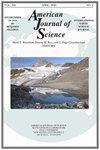硅酸盐熔体中金属氧化物的偏摩尔体积:库仑相互作用的影响
IF 2.5
3区 地球科学
Q3 GEOSCIENCES, MULTIDISCIPLINARY
引用次数: 0
摘要
溶解在硅质熔体中的碱性、碱性土、许多3d和大多数4f改性剂氧化物与SiO2非理想混合,产生线性、密度-成分混合趋势,由此确定改性剂氧化物的偏摩尔体积(V*)。对这些实验数据的分析表明,碱、碱土、大多数4f和许多三维改性氧化物的偏摩尔体积可以通过:精确地再现,其中FC = (z+•z−)/d2(库仑定律),z表示电荷。键长' d '是离子晶体中观察到的阳离子(M+, M2+, M3+或M4+)和氧化离子(O2−)的半径之和。系数m和b分别为0.325和1.38 Å/atom。形成网络的氧化物的偏摩尔体积也符合上述方程,其中' m ' = ~ 3.25, ' b ' = 1.68 Å/原子。库仑引力(FC)是阳离子场强(z+/d2)和阴离子上的电荷的乘积,其中d是两个电荷中心之间的距离。在含有改性阳离子的硅酸盐熔体中,硅四面体的顶端O原子带负电荷,并由于库仑吸引而向阳离子偏移。在阳离子周围产生的坍塌被称为“电致伸缩”。因此,改性剂氧化物的偏摩尔体积(V*)由两项组成,即改性剂阳离子多面体的体积(VPoly)和与阳离子周围四面体坍塌相关的体积(VCol): VCol对所有改性剂氧化物都是负的,并且随着阳离子上电荷的增加和配位数(CN)的增加而变得越来越负。VPoly本身由两项组成,固有体积(VInt)和排除体积(VEx)。本征体积可以通过离子晶体的阳离子半径和O2−半径来计算。VEx反映了阳离子多面体周围的堆积状态。对于所有的改性氧化物都等于6.83 Å3/原子,因此VPoly的表达式为:VPoly和VCol之间存在线性关系,这导致了观察到的线性密度组成趋势,由此确定了部分摩尔体积。尽管它们呈线性,但这些趋势是硅质熔体中改性剂氧化物和SiO2组分不理想混合的结果。我们发现四面体在改性剂阳离子周围坍塌,这与传统观点不同,传统观点认为改性剂阳离子占据硅酸盐网络中的空隙,但对熔体结构的影响有限。这些结果表明,改性剂阳离子通过引起周围四面体在向改性剂阳离子坍塌过程中旋转、扭曲、倾斜和弯曲,从而对网络产生实质性的影响。本文章由计算机程序翻译,如有差异,请以英文原文为准。
Partial molar volumes of metal oxides in silicate melts: Effects of Coulombic interactions
Alkaline, alkaline earth, many 3d and most 4f modifier oxides dissolved in siliceous melts mix non-ideally with SiO2 to produce linear, density-compositional mixing trends from which partial molar volumes of modifier oxides (V*) are determined. An analysis of these experimental data reveals that the partial molar volumes of alkali, alkaline earths, most 4f and many 3d modifier oxides partial molar volumes are accurately reproduced by: where FC = (z+•z−)/d2 (Coulomb's Law) and z indicates charge. The bond length ‘d’ is the sum of the radii of the cation (M+, M2+, M3+ or M4+) and oxide ion (O2−) observed in ionic crystals. The coefficients ‘m’ and ‘b’ are 0.325 and 1.38 Å/atom respectively. Partial molar volumes of network-forming oxides also conform to the above equation where ‘m’ = ∼3.25 and ‘b’ is 1.68 Å/atom. Coulomb's force of attraction (FC) is the product of the cationic field strength (z+/d2) and the charge on an anion, where ‘d’ is the distance separating the centers of the two charges. In silicate melts containing modifier cations, apical O atoms of Si tetrahedra are negatively charged and are displaced toward the cations due to Coulombic attraction. The resulting collapse around the cations is referred to as ‘electrostriction’. Partial molar volumes (V*) of modifier oxides are thus composed of two terms, the volume of the polyhedron of the modifier cation (VPoly) and a volume associated with collapse of tetrahedra around the cation (VCol): VCol is negative for all modifier oxides and becomes increasingly negative with increased charge on the cation and with increased coordination number (CN). VPoly is itself composed of two terms, an intrinsic volume (VInt) and an excluded volume (VEx). The intrinsic volume can be calculated using cationic and O2− radii evaluated from ionic crystals. VEx reflects the state of packing around cationic polyhedra. It is equal to 6.83 Å3/atom for all modifier oxides so that the expression for VPoly is: A linear relationship exists between VPoly and VCol which results in the observed linear density-composition trends from which partial molar volumes are determined. In spite of their linearity, these trends are the result of non-ideal mixing of modifier oxide and SiO2 components in siliceous melts. Our finding that tetrahedra collapse around modifier cations differs from the traditional perspective where modifier cations were considered to occupy voids within the silicate network but otherwise had limited effect on melt structure. These results demonstrate that modifier cations affect the network substantially by causing surrounding tetrahedra to rotate, twist, tilt and flex during their collapse toward modifier cations.
求助全文
通过发布文献求助,成功后即可免费获取论文全文。
去求助
来源期刊

American Journal of Science
地学-地球科学综合
CiteScore
5.80
自引率
3.40%
发文量
17
审稿时长
>12 weeks
期刊介绍:
The American Journal of Science (AJS), founded in 1818 by Benjamin Silliman, is the oldest scientific journal in the United States that has been published continuously. The Journal is devoted to geology and related sciences and publishes articles from around the world presenting results of major research from all earth sciences. Readers are primarily earth scientists in academia and government institutions.
 求助内容:
求助内容: 应助结果提醒方式:
应助结果提醒方式:


